by Heather Plett | Feb 18, 2015 | circle, Community, Leadership, Uncategorized
“The moment we commit ourselves to going on this journey, we start to encounter our three principal enemies: the voice of doubt and judgment (shutting down the open mind), the voice of cynicism (shutting down the open heart), and the voice of fear (shutting down the open will).” – Otto Sharmer
Lessons in colonialism and cultural relations
Recently I had the opportunity to facilitate a retreat for the staff and board members of a local non-profit. At the retreat, we played a game called Barnga, an inter-cultural learning game that gives people the opportunity to experience a little of what it feels like to be a “stranger in a strange land”.
To play Barnga, people sit at tables of four. Each table is given a simple set of rules and a deck of cards. After reading the rules, they begin to play a couple of practice rounds. Once they’re comfortable with the rules of play, they are instructed to play the rest of the game in silence.
After 15 or 20 minutes of playing in silence, the person who won the most tricks at each table is invited to move to another table. The person who won the least tricks moves to the table in the opposite direction. All of the rules sheets are removed from the tables.
 The game begins once again, but what people don’t realize until they’ve played a round or two is that the rules are different at each able. At some tables, ace is high and at other tables it’s low. At one table, diamonds are trump, at another clubs are trump, and so on.
The game begins once again, but what people don’t realize until they’ve played a round or two is that the rules are different at each able. At some tables, ace is high and at other tables it’s low. At one table, diamonds are trump, at another clubs are trump, and so on.
Newcomers (ie. immigrants) have now arrived in a place where they expect the rules to be the same, find out after making a few mistakes that they are in fact different, and have no shared language to figure out what they’re doing wrong. Around the room you can see the confusion and frustration begin to grow as people try to adapt to the new rules, and those at the table try to use hand gestures and other creative means to let them know what they’re doing wrong.
After another 15 or 20 minutes, the winners and losers move to new tables and the game begins again. This time, people are less surprised to find out there are different rules and more prepared to adapt and/or help newcomers adapt.
After playing for about 45 minutes, we gathered in a sharing circle to debrief about how the experience had been for people. Some shared how, even though they stayed at the table where the rules hadn’t changed, they began to doubt themselves when others insisted on playing with different rules. Some even chose to give up their own rules entirely, even though they hadn’t moved.
In the group of 20 people, there was one white male and 19 women of mixed races. What was revealing for all of us was what that male was brave enough to admit.
“I just realized what I’ve done,” he said. “I was so confident that I knew the rules of the game and that others didn’t that I took my own rules with me wherever I went and I enforced them regardless of how other people were playing.”
It should be stated that this man is a stay-at-home dad who volunteers his time on the board of a family resource centre. He is by no means the stereotypical, aggressive white male you might assume him to be. He is gracious and kind-hearted, and I applaud him for recognizing what he’d done.
What is equally interesting is that all of the women at the tables he moved to allowed him to enforce his set of rules. Whether they doubted themselves enough to not trust their own memory of the rules, or were peacekeepers who decided it was easier to adapt to someone else who felt stronger about the “right” way to do things, each of them acquiesced.
Without any ill intent on his part, this man inadvertently became the colonizer at each table he moved to. And without recognizing they were doing so, the women at those tables inadvertently allowed themselves to be colonized.
If we had played the game much longer, there may have been a growing realization among the women what was happening, and there might have even been a revolt. On the other hand, he might have simply been allowed to maintain his privilege and move around the room without being challenged.
Making the learning personal
Since that game at last week’s retreat, the universe has found multiple opportunities to reinforce this learning for me. I have been reminded more than once that, despite my best efforts not to do so, I, too, sometimes carry my rules with me and expect others to adapt.
Yesterday, these lessons came from multiple directions. In one case, I was challenged to consider the language I used in the blog post I shared yesterday. In writing about the race relations conversation I helped Rosanna Deerchild to host on Monday night, I mentioned that “we all felt like we’d been punched in the gut” when our city was labeled the “most racist in Canada”. Several people pointed out (and not all kindly) that I was making an assumption that my response to the article was an accurate depiction of how everyone felt. By doing so, I was carrying my rules with me and overlooking the feelings of the very people the article was about.
Not everyone felt like they’d been punched in the gut. Instead, many felt a sense of relief that these stories were finally coming out.
In the critique of my blog post, one person said that my comment about feeling punched in the gut made her feel punched in the gut. Another reflected that mine was a “settler’s narrative”. A third said that I was using “the same sensationalist BS as the Macleans article”.
I was mortified. In my best efforts to enter this conversation with humility and grace, I had inadvertently done the opposite of what I’d intended. Like the man in the Barnga game, I assumed that everyone was playing by the same set of rules.
I quickly edited my blog post to reflect the challenges I’d received, but the problem intensified when I realized that the Macleans journalist who wrote the original article (and who’d flown in for Monday’s gathering) was going to use that exact quote in a follow-up piece in this week’s magazine. Now not only was I opening myself to scrutiny on my blog, I could expect even harsher critique on a national scope.
I quickly sent her a note asking that she adjust the quote. She was on a flight home and by the time she landed, the article was on its way to print. I felt suddenly panicky and deeply ashamed. Fortunately, she was gracious enough to jump into action and she managed to get her editor to adjust the copy before it went to print.
Surviving a shame shitstorm
Last night, I went to bed feeling discouraged and defeated. On top of this challenge, I’d also received another fairly lengthy email about how I’ve let some people down in an entirely different circle, and I was feeling like all of my efforts were resulting in failure.
At 2 a.m., I woke in the middle of what Brene Brown calls a “shame shitstorm”. My mind was reeling with all of my failures. Despite my best efforts to create spaces for safe and authentic conversation, I was inadvertently stepping on toes and enforcing my own rules of engagement.
As one does in the middle of the night, I started second-guessing everything, especially what I’d done at the gathering on Monday night. Was I too bossy when I hosted the gathering? Did I claim space that wasn’t mine to claim? Were my efforts to help really micro-aggressions toward the very people I was trying to build bridges with? Should I just shut up and step out of the conversation?
By 3 a.m., I was ready to yank my blog post off the internet, step away into the shadows, and never again enter into these difficult conversations.
By 4 a.m., I’d managed to talk myself down off the ledge, opened myself to what I needed to learn from these challenges, and was ready to “step back into the arena”.
Some time after 4, I managed to fall back to sleep.
Moving on from here
This morning, in the light of a new day, I recognize this for what it is – an invitation for me to address my own shadow and deepen my own learning of how I carry my own rules with me.
If I am not willing to address the colonizer in me, how can I expect to host spaces where I invite others to do so?
Nobody said this would be easy. There will be more sleepless nights, more shame shitstorms, and more days when my best efforts are met with critique and even anger.
But, as I said in the closing circle on Monday night, I’m going to continue to live with an open heart, even when I don’t know the next right thing to do, and even when I’m criticized for my best efforts.
Because if I’m not willing to change, I have no right to expect others to do so.
by Heather Plett | Feb 17, 2015 | circle, Community, connection, courage, Leadership, Uncategorized
What do you do when your city has been named the “most racist in Canada“?
Some people get defensive, pick holes in the article, and do everything to prove that the label is wrong.
Some people ignore it and go on living the same way they always have.
And some people say “This is not right. What can we do about it?”
When that story came out, some of us felt like we’d been punched in the gut. Though it’s no surprise to most of us that there’s racism here, this showed an even darker side to our city than many of us (especially those who, like me, sometimes forget to turn our gaze beyond our bubble of white privilege) had acknowledged. Insulting our city is like insulting our family. Nobody likes to hear how much ugliness exists in one’s family.
Note: I have been challenged to reflect on my language in the above paragraph. Originally it said “all of us felt like we’d been punched in the gut” and that is not an accurate reflection. Instead, some felt like it was a relief that these stories were finally coming out. I appreciate the challenge and will continue to reflect on how I can speak about this issue through a lens that allows all stories to be heard. That’s part of the reason I’m in this conversation – to look inside for the shadow of colonialism within so that I can step beyond that way of seeing the world and serve as a bridge-builder.
As I mentioned in an earlier post, I began to wrestle with what it would mean for me to be a change-maker in my city. I emailed the mayor and offered to help host conversations, I sat in circle at the Indigenous Family Centre, I accepted the invitation of the drum, and I was cracked open by a sweat lodge.
I shared my interest in hosting conversations around racism on Facebook, and then I waited for the right opportunity to present itself. I tried to be as intentional as possible not to enter the conversation as a “colonizer who thinks she has the answer.” It didn’t take long for that to happen.
 Rosanna Deerchild was one of the people quoted in the Macleans article, and her face made it to the front cover of the magazine. Unwillingly and unexpectedly, she became the poster child for racism. Being the wise and wonderful woman that she is, though, she chose to use that opportunity to make good things happen. She posted on her own Facebook page that she wanted to gather people together around the dinner table to have meaningful conversations about racism. A mutual friend connected me to her conversation, and I sent her a message offering to help facilitate the conversation. She took me up on it.
Rosanna Deerchild was one of the people quoted in the Macleans article, and her face made it to the front cover of the magazine. Unwillingly and unexpectedly, she became the poster child for racism. Being the wise and wonderful woman that she is, though, she chose to use that opportunity to make good things happen. She posted on her own Facebook page that she wanted to gather people together around the dinner table to have meaningful conversations about racism. A mutual friend connected me to her conversation, and I sent her a message offering to help facilitate the conversation. She took me up on it.
At the same time, a few other people jumped in and said “count me in too”. Clare MacKay from The Forks said “we’ll provide a space and an international feast”. Angela Chalmers and Sheryl Peters from As it Happened Productions said “we’d like to film the evening”.
With just one short meeting, less than a week before it was set to happen, the five of us planned an evening called “Race Relations and the Path Forward – A Dinner and Discussion with Rosanna Deerchild”. We started sending out invitations, and before long, we had a list of over 50 people who said “I want to be part of this”. Lots of other people said “I can’t make it, but will be with you in spirit.”
In the end, a beautifully diverse group of over 80 people gathered.
We started with a hearty meal, and then we moved into a World Cafe conversation process. In the beginning, everyone was invited to move around the room and sit at tables where they didn’t know the other people. Each table was covered with paper and there were coloured markers for doodling, taking notes, and writing their names.
Before the conversations began, I talked about the importance of listening and shared with them the four levels of listening from Leading from the Emerging Future.
- Downloading:
the listener hears ideas and these merely reconfirm what the listener already knows
- Factual listening:
the listener tries to listen to the facts even if those facts contradict their own theories or ideas
- Empathic listening
: the listener is willing to see reality from the perspective of the other and sense the other’s circumstances
- Generative listening
: the listener forms a space of deep attention that allows an emerging future to “land” or manifest
“What we really want in this room,” I said, “is to move into generative listening. We want to engage in the kind of listening that invites new things to grow.”
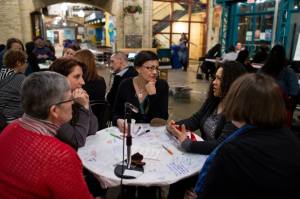
photo credit: Greg Littlejohn
For the first round of conversation, everyone was invited to get to know each other by sharing who they were, where they were from, and what misconceptions people might have about them. (For example, I am a suburban white mom who drives a minivan, so people may be inclined to jump to certain conclusions about me based on that information.)
After about 15 minutes, I asked that one person remain at the table to serve as the “culture keeper” for that table, holding the memories of the earlier conversations and bringing them into the new conversation when appropriate. Everyone else at the table was asked to be “ambassadors”, bringing their ideas and stories to new tables.
For the second round of conversation, I invited people to share stories of racism in their communities and to talk about the challenges and opportunities that exist. After another 15 minutes, the culture keepers stayed at the tables and the ambassadors carried their ideas to another new table.
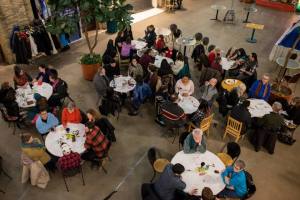
photo credit: Greg Littlejohn
In the third round of conversation, they were asked to begin to think of possibilities and ideas and to consider “what can we do right now about these challenges and opportunities?”
The one limitation of being the facilitator is that I couldn’t engage fully in the conversations. Instead, I floated around the room listening in where I could. This felt a little disappointing to me, as I would have liked to have immersed myself in the stories and ideas, but at the same time, circling the room gave me the sense that I was helping to hold the edges of the container, creating the space where rich conversation could happen.
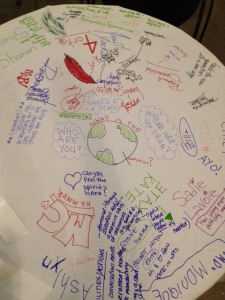 After the conversation time had ended, the culture keepers were invited to the front of the room to share the essence of what they’d heard at their tables. Some talked about the need to start in the education system, ensuring that our youth are being accurately taught the Indigenous history of our country, others talked about how this needs to be a political issue and we need to insist that our politicians take these concerns seriously, and still others talked about how we each need to start small, building more one-on-one relationships with people from other cultures. One young woman shared her personal story of being bullied in school and how difficult it is to find a place where she is allowed to “just be herself”. Another woman shared about how hard she has had to work to be taken seriously as an educated Indigenous woman.
After the conversation time had ended, the culture keepers were invited to the front of the room to share the essence of what they’d heard at their tables. Some talked about the need to start in the education system, ensuring that our youth are being accurately taught the Indigenous history of our country, others talked about how this needs to be a political issue and we need to insist that our politicians take these concerns seriously, and still others talked about how we each need to start small, building more one-on-one relationships with people from other cultures. One young woman shared her personal story of being bullied in school and how difficult it is to find a place where she is allowed to “just be herself”. Another woman shared about how hard she has had to work to be taken seriously as an educated Indigenous woman.
One of the people who shared mentioned that the Macleans article was a “gift wrapped in barbed wire”. Those of us in the room have chosen to unwrap the barbed wire to find the opportunities underneath.
Another person said that the golden rule is not enough and that it is based on a colonizers’ view of the world. “Do unto others as you would have them do unto you” has to shift into the platinum rule, “Do unto others as they would have you do unto them.” To illustrate his point, he talked about how Indigenous people go for job interviews and because they don’t look people in the eye and don’t have a firm handshake, people assume they don’t have confidence. “Understand their culture more deeply and you’ll understand more about how to treat them.”
As one person mentioned, “the problem is not in this room”, which was a challenge to us all to have conversations not only with the people who think like us, but with those who think differently. Real change will come when we influence those who hold racist views to see people of different nationalities as equals.
There were many other ideas shared, but my brain couldn’t hold them all at once. I will continue to process this and look back over the notes and flipcharts. And there will be more conversations to follow.
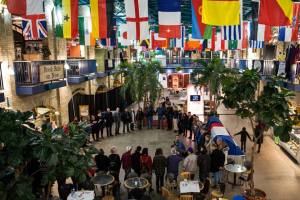
photo credit: Greg Littlejohn
After we’d heard from all of the tables, we all stood up from our tables and stepped into a circle. We have been well taught by our Indigenous wisdom-keepers that the circle is the strongest shape, and it seemed the right way to end the evening. Once in the circle, I passed around a stone with the word “courage” engraved on it. “I invite each of you to speak out loud one thing that you want to do with courage to help build more positive race relations in our city.” One by one, we held the stone and spoke our commitment into the circle.
We took the energy and ideas in the room and made it personal. Some of the ideas included “I’ll read more Indigenous authors.” “I’ll teach my children to respect people of all races.” “I’ll take political action.” “I’ll take more pride in my Indigenous identity.” “I will host more conversations like this.” “The next time I hear someone say ‘I’m not racist, but…’ I will challenge them.” “I’ll continue my work with Meet me at the Bell Tower.” “I will bring these ideas to my workplace.” “I will find reasons to spend time in other neighbourhood, outside my comfort zone.”
I didn’t realize until later, when I was looking at the photos taken by Greg Littlejohn, that we were standing under the flags of the world. And the lopsided circle looks a little more like a heart from the angle his photo was taken.
This is my Winnipeg. These eighty people who gathered (and all who supported us in spirit) are what I see when I look at this city. Yes there is racism here. Yes we have injustice to address. Yes we have hard work ahead of us to make sure these ideas don’t evaporate the minute we walk out of the room. AND we have a beautiful opportunity to transform our pain into something beautiful.
We have the will, we have the heart, we have a community of support, and we have the opportunity. A year from now, I hope that a different story will be told about our city.
Note: If you’re wondering “what next?”, I can’t say that for certain yet. I know that this will not be a one-time thing, but I’m not sure what will emerge from it yet. The organizers will be getting together to reflect and dream and plan. And in the meantime, I trust that each person who made a commitment to courage in that circle, will carry that courage into action.
by Heather Plett | Jan 28, 2015 | art of hosting, change, growth, journey, Leadership
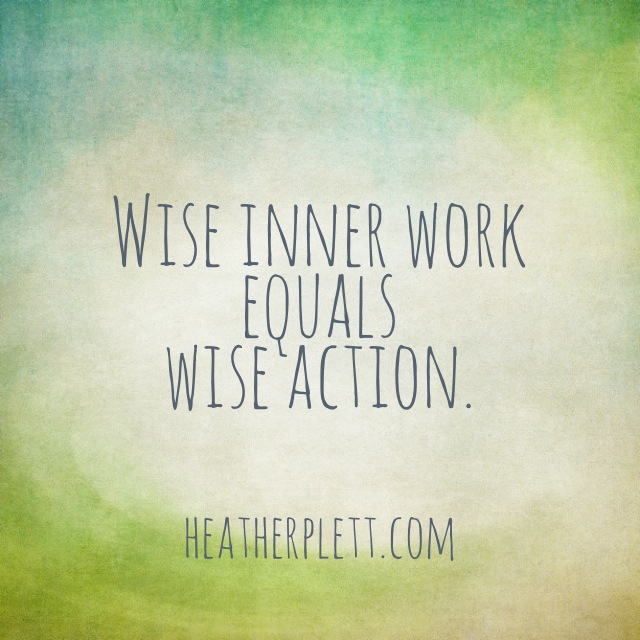
“The success of our actions as change-makers does not depend on what we do or how we do it, but on the inner place from which we operate.” – Otto Sharmer
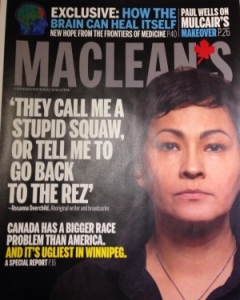 Last week, the city that I love and call home was named “the most racist city in Canada.” That hurt. It felt like someone had insulted my family.
Last week, the city that I love and call home was named “the most racist city in Canada.” That hurt. It felt like someone had insulted my family.
The article mentions many heartbreaking stories of the way that Indigenous people have been treated in our city, and while I wanted to say “but… we’re so NICE here! Really! You have to see the other side too!” I knew that there was undeniable truth I had to face and own. My family isn’t always nice. Neither is my city.
Though I work hard not to be racist, have many Indigenous friends in my circles, and am married to a Metis man, I knew that my response to the article needed to not only be a closer look at my city but a closer look at myself. I may not be overtly racist, but are there ways that I have been complicit in allowing this disease to grow around me? Are there things that I have left unsaid that have given people permission for their racism? Are there ways in which my white privilege has made me blind?
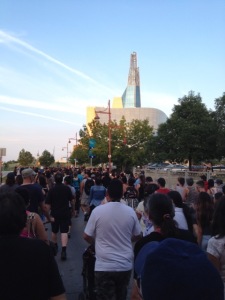 Ever since the summer, when I attended the vigil for Tina Fontaine, a young Indigenous woman whose body was found in the river, I have been feeling some restlessness around this issue. I knew that I was being nudged into some work that would help in the healing of my city and my country, but I didn’t know what that work was. I started by carrying my sadness over the murdered and missing Indigenous women into the Black Hills when I invited women on a lament journey.
Ever since the summer, when I attended the vigil for Tina Fontaine, a young Indigenous woman whose body was found in the river, I have been feeling some restlessness around this issue. I knew that I was being nudged into some work that would help in the healing of my city and my country, but I didn’t know what that work was. I started by carrying my sadness over the murdered and missing Indigenous women into the Black Hills when I invited women on a lament journey.
This week, after the Macleans article came out, our mayor made a courageous choice in how he responded to the article. In a press conference called shortly after the article spread across the internet, he didn’t get defensive, but instead he spoke with vulnerability about his own identity as a Metis man and about how his desire is for his children to be proud of both of the heritages they carry – their mother’s and his. He then invited several Indigenous leaders to speak.
There was something about the mayor’s address that galvanized me into action. I knew it was time for me to step forward and offer what I can. I sent an email and tweet to the mayor, thanking him for what he’d done and then offering my expertise in hosting meaningful conversations. Because I believe that we need to start healing this divide in our city and healing will begin when we sit and look into each others’ eyes and listen deeply to each others’ stories.
After that, I purchased the url letstalkaboutracism.com. I haven’t done anything with it yet, but I know that one of the things I need to do is to invite more people into a conversation around racism and how it wounds us all. I have no idea how to fix this, but I know how to hold space for difficult conversations, so that is what I intend to do. Circles have the capacity to hold deep healing work, and I will find a way to offer them where I can.
Since then, I have had moments of clarity about what needs to be done next, but far more moments of doubt and fear. At present, I am sitting with both the clarity and the doubt, trying to hold both and trying to be present for what wants to be born.
Here are some of the things that are showing up in my internal dialogue:
- Isn’t it a little arrogant to think I have any expertise to offer in this area? There are so many more qualified people than me.
- What if I offend the Indigenous people by offering my ideas, and become like the colonizers who think they have the answers and refuse to listen to the wisdom of the people they’re trying to help?
- There are already many people doing healing work on this issue, and many of them are already holding Indigenous circles. I have nothing unique to contribute.
- What if I host sharing circles and too much trauma and/or conflict shows up in the circle and I don’t know how to hold it?
- What if this is just my ego trying to do something “important” and get attention for me rather than the cause?
And so the conversation in my head goes back and forth. And the conversations outside of my head (with other people) aren’t much different.
At the same time as this has been going on, I have been working through the first two weeks of course material for U Lab: Transforming Business, Society and Self. In one of the course videos, Otto Sharmer talks about the four levels of listening – from downloading (where we listen to confirm habitual judgements), to factual (listening by paying attention to facts and to novel or disconfirming data), to empathic (where we listen with our hearts and not just our minds), and finally to generative (where we move with the person speaking into communion and transformaton).
As soon as I read that, I knew that whatever I do to help create space for healing in my city, it has to start with a place of deep listening – generative listening, where all those in the circle can move into communion and transformation. I also knew, as I sat with that idea, that that generative listening has to begin with me.
If I am to serve in this role, I need to be prepared to move out of my comfort zone, into generative listening with people who have been wounded by racism in our city AND with people who live with racial blindspots. AND (in the words of Otto Sharmer) I need to move out of an ego-system mentality (where I am seeking my own interest first), into a generative, eco-system mentality (where I am seeking the best interest of the community and world around me).
So that is my intention, starting this week. I already have a meeting planned with an Indigenous friend who has contributed to, and wants to teach, an adult curriculum on racism, to find out how I can support her in this work. And I will be meeting with another friend, a talented Indigenous musician, about possible partnership opportunities. And I will be a sitting in an Indigenous sharing circle, listening deeply to their stories.
I am not sharing these stories to say “look at me and all of the good things I’m doing”. That would be my ego talking, and that’s one of the things I’m trying to avoid. Instead, I’m sharing it to say “look at the complexity that a thinking woman (sometimes over-thinking woman) goes through in order to become an effective, and humble, change-maker.
That brings me back to the quote at the top of the page.
“The success of our actions as change-makers does not depend on what we do or how we do it, but on the inner place from which we operate.” – Otto Sharmer
The inner place. That is what will determine the success of our actions. I can have all the smart ideas in the world, and a big network of people to help roll them out, but if I have not done the internal work first, my success will be limited.
If I don’t do the inner work first, then my ego will run rampant and I will stomp all over the people that I say I care about. Or I will suffer from jealousy, or self doubt, or self-centredness, or vindictiveness, or all of the above.
If I don’t do the internal work and ask myself important questions about what is rooted in my ego and what is generative, then I could potentially do more harm than good.
So how do I do that internal work? Here are some of the things that I do:
1. As we say in Art of Hosting work, I host myself first. In other words, I ask of myself whatever I would ask of others I might invite into circle, I look for both my shadows and my strengths, and I do the kind of self-care I would encourage my clients to do when they find themselves in the middle of big shifts.
2. I ask myself a few pointed questions to determine whether the ego is too involved. For example, when my friend came to me to share the work she wants to do, hosting circles in the curriculum she has developed, there was a little ego-voice that spoke up and said “But wait! This was supposed to be YOUR work! If you support her, you’ll have to be in the background.” The moment I heard that voice, I had to ask myself “do you truly want to make a difference around the issue of racism or do you just want to make a name for yourself?” And: “If this is successful in impacting change, but you have only a secondary role, is it still worthwhile?” It didn’t take long for me to know that I wanted to be wholeheartedly behind her work.
3. I pause. As we learn in Theory U, the pause is the most important part – it’s where the really juicy stuff happens. The pause is where we notice patterns that we were too busy to notice before. It’s where the voice of wisdom speaks through the noise. It’s where we are more able to sink into generative listening. In Theory U, we call it “presencing” – a combination of “presence” and “sensing”. There’s a quality of mindfulness in the pause that helps me notice and experience more and be awake to receive more wisdom.
4. I do the practices that help bring me to wise thought and wise action. For me, it’s journaling, art, mandala-making, nature walks, and labyrinth walks. I never make a major decision without spending intentional time in one of those practices. Almost always, something more profound and wise shows up that I wouldn’t have considered earlier.
5. I listen. The ego doesn’t want me to seek input from other people. The ego wants to be in control and not invite partners in to share the spotlight. If I want to move out of ego-system, though, I need to spend time listening for others’ stories and wisdom. This doesn’t mean I listen to EVERYONE. Instead, I use my discretion about who are the right people to seek wise council from. I listen to those who have done their own personal work, whose own egos won’t try to trap me and keep me from succeeding, and who genuinely care about the issue I’m working on.
6. I check in with myself and then move into action when I’m ready. Although the pause, the questions, and the personal practice are all very important, the movement into action is equally important. There have been far too many times when my questions and ego have trapped me in a spiral and I’ve failed to move into action. Just thinking about it won’t impact change. I need to be prepared to act, even if I still have doubt. If I fail in that action, I can always go back and re-enter the presencing stage.
This is an ongoing story and I hope to continue sharing it as it emerges. If you, too, want to become a change-maker, then I’d love to hear from you. What are the processes you go through in order to ensure your “inner place” is healthy and your listening and actions are generative? What issues are currently calling you into action?
If this resonates with you, check out The Spiral Path, which begins February 1st. Based on the three stages of the labyrinth, (release, receive, and return), it invites you to go inward to do this internal work and then to move outward to serve in the way that you are called.
Also… we’re looking for a few more change-makers to attend Engage, a one-of-a-kind retreat that will teach you more about how to do your inner work so that you can move into generative action.
by Heather Plett | Dec 9, 2014 | Uncategorized
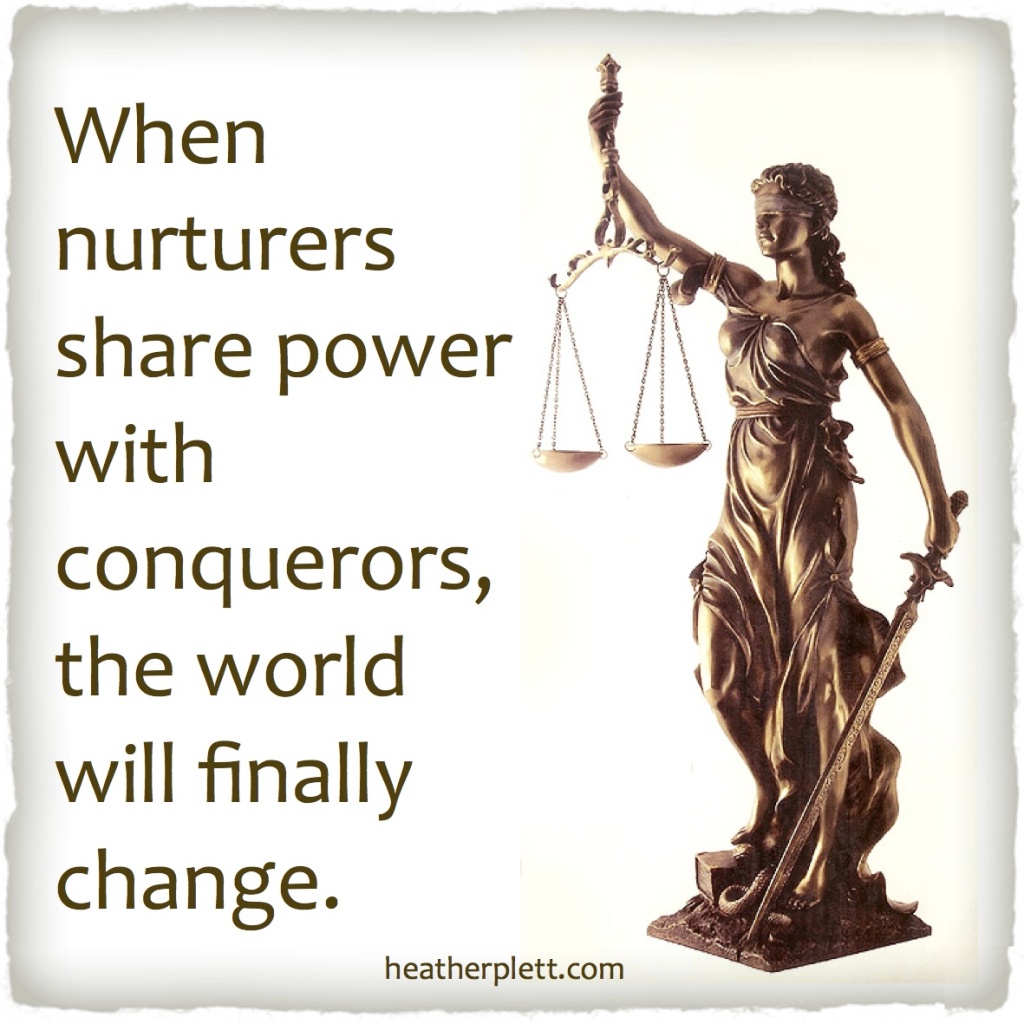 There is Jian Gomeshi, who beat up women for sport and got away with it for years because we all wanted to believe he really was the charming and likeable man we heard on the radio.
There is Jian Gomeshi, who beat up women for sport and got away with it for years because we all wanted to believe he really was the charming and likeable man we heard on the radio.
And then there is Bill Cosby who drugged and raped possibly dozens of women who came to him for advice, and also got away with it because he was Dr. Huxtable, and he was the voice behind “NOAH!” and you just HAVE to be able to trust someone who’s that fun and likeable.
And then… different but still related… there’s Darren Wilson, a police officer who won’t be punished for killing Michael Brown.
And there is Daniel Pantaleo, who forced Eric Garner to the ground in a choke hold, listened to him say “I can’t breathe” repeatedly, and kept going until he was dead. He won’t stand trial either.
And there are countless other young black men dying. And countless young Indigenous girls dying. And their deaths barely warrant a mention in the newspaper.
And then there is the ferocious beast called the economy that gobbles up the earth and spits it out in its hunger for more, more, MORE.
All of these things are different and yet the same. All are about the damage done when force is left unchecked.
And I want to scream “How did we end up here?!? How did we get to this place where women can be beat up and raped by celebrities who get away with it? Where the police have the right to kill with impunity? Where pipelines are given permission to plow through sacred land? Where we turn a blind eye again and again to rape, destruction, and murder?”
And though I scream it into the wind, I know that the answer sits like a lump of toxic waste in my heart.
We ended up here because we have created a culture in which the conqueror is revered above the nurturer.
We ended up here because we placed power above love, hierarchy above collaboration, progress above community, and economy above conservation.
We ended up here because we consistently allow our leaders to build up our military might, and make decisions based in fear and protectionism.
We ended up here because we have allowed ourselves to believe that the financial economy in its present state is the only way an economy can be shaped, and if it doesn’t grow we are all doomed.
We ended up here because of patriarchy, a system rooted in fear.
Patriarchy is afraid of losing control, afraid of the unpredictability of a system not based in hierarchy, and afraid to give power to women or anyone who might upset the status quo.
You may say “but Michael Brown and Eric Garner died because of racism, not patriarchy” and I would argue that it’s all related to the same problem. It’s all rooted in a system that creates an imbalance of power and allows one race to dominate over another and one gender to dominate over another.
Patriarchy is not about men and women. Patriarchy is about dominance.
In a patriarchal system, where fear guides the decision-making, anything that does not comply with the established social order must be locked up or destroyed. So they create stronger police forces, they make it harder for women to control their own bodies, they create an image of God as a controlling masculine figure, and they justify the rape and pillaging of the earth. Patriarchy is the bully in the playground who must have everyone follow his rules or he mows them down.
Patriarchy is a monster hungry for dominance and afraid it will disappear if it gives up even a little bit of its power.
It wasn’t always this way. There was a time when the nurturers were revered along with the conquerors.
There was a time when women were revered for their ability to give birth, for their gifts of healing, and their deep connection to the earth. There was a time when religions were not dominated by masculine deities and the goddess held an equal place.
But then fear began to grow like a weed and the healers and goddess worshipers were branded as witches and the midwives were branded as charlatans. The weed grew, and millions of women were tortured and burned at the stake for knowing too much about the earth, for having too much power over the female reproductive system, and for adhering to a spirituality that could not be contained by those who sought control. (Some say as many as 8 million were tortured or executed in a couple of centuries.)
And so the weed spread, and patriarchy joined hands with racism to mow over anyone in their path and dominate all whose unpredictability made them uncomfortable.
And all those in its path remembered the burning times for generations to come and the memory of it kept us in our place.
How do we stop the weed from spreading further?
There is no simple answer to that question, but we each have to begin by opening our eyes and seeing the weed for what it is. And we have to begin the slow and sometimes painful work of plucking its roots out of our own hearts and our own communities. Because each of us, whether we know it or not, has been infected by this weed and each of us has been taught to be complicit in its growth.
We have been taught how to comply, how to stay in line, and how to not get burned at the stake. We have been taught to guard ourselves and our sons and our daughters. We have been taught to go underground with our deviant belief systems and our connection with Mother Earth. We have been taught to accept the dominant system because not accepting it may cost us our lives. We have been taught that rising up is too dangerous, accusing our rapists is too dangerous, and challenging those in authority is too dangerous.
But gradually we are waking up. Gradually we are rising up. Gradually we are finding each other and daring to stand together in a new power, a shared power. Gradually we are learning to replace dominance with collaboration. Gradually we are overthrowing power. Gradually we are returning to the wisdom of the earth.
Gradually we are releasing the power of the feminine into the world again.
Gradually we are returning to and honouring the nurturer, the healer, and the midwife that we once burned at the stake.
There are many days that feel discouraging, many days that feel like this is taking too long. There are many days when the weed seems to have been fed fertilizer and its grown is exponential. There are many days when those of us who are imagining a new world feel like our efforts are useless. Those days have come fast and furious in recent weeks when celebrities are found to be repeated sexual offenders and cops have gotten away with murder.
But we must not give up. We must continue to tend the new seed growing and trust that it will one day outgrow the weed.
It took centuries to burn the power out of women and it will take centuries for it to come out of hiding and rise up again.
Let us continue to dream of a day when both nurturers and conquerors will have equal power.
 The game begins once again, but what people don’t realize until they’ve played a round or two is that the rules are different at each able. At some tables, ace is high and at other tables it’s low. At one table, diamonds are trump, at another clubs are trump, and so on.
The game begins once again, but what people don’t realize until they’ve played a round or two is that the rules are different at each able. At some tables, ace is high and at other tables it’s low. At one table, diamonds are trump, at another clubs are trump, and so on.








